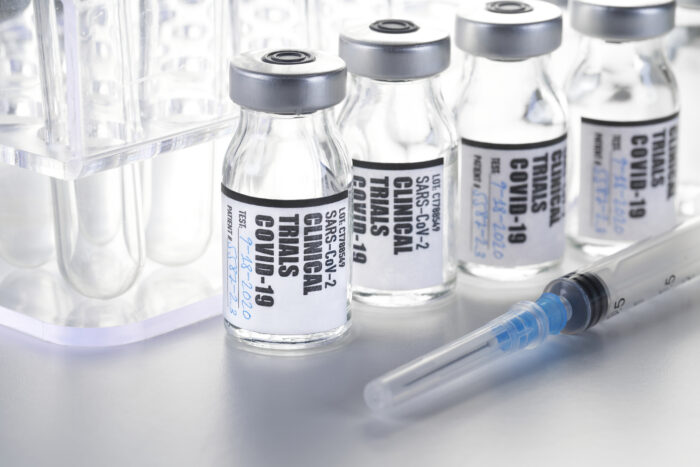
With three Covid-19 vaccines now authorized by the FDA, focus is now turning to manufacturing capacity. As Novavax prepares to add its vaccine to the mix, it is gearing up to meet global demand with the projected capability of producing about 2 billion vaccine doses by the middle of this year.
Stanley Erck, president and CEO of the Gaithersburg, Maryland-based company, said manufacturing plants in 10 countries are currently producing antigen at commercial scale for the company’s vaccine candidate. The goal is to have vaccines ready for shipment as soon as the company receives emergency authorizations in the U.S. and other markets.
“The expectation is that all of the plants will be at full scale by April,” Erck said on a conference call. “So in April, May, June, we should be finishing, filling product in advance of regulatory approvals.”
Erck said he hopes that by July, the company will be in position to ship about 110 million doses to the U.S. government. But he added that the first doses will go to U.K., assuming that’s the market that secures the first authorization.
Rolling submissions have been started with regulators in the U.K., Europe, Canada, Australia, and New Zealand. Erck said Novavax has kept the FDA apprised of the vaccine’s progress and the company plans to file a request for U.S. emergency authorization in the second quarter of this year.
The Novavax Covid vaccine candidate is protein-based, engineered from the genetic sequence of the novel coronavirus. Like the others that have reached the market, this vaccine elicits an immune response from the characteristic spike protein prominent on the surface of SARS-CoV-2, the novel coronavirus. Novavax produces its version of the spike protein by inserting the genetic sequence for the spike protein into baculovirus, a type of virus that infects insects.
The protein-making machinery of the insect cells use the genetic sequence as a blueprint for manufacturing spike proteins. These protein antigens are purified and arranged around a nanoparticle core in a way that resembles how they would appear on the actual virus, a presentation that prompts an effective immune response, according to the company.
The Novavax vaccine comes with an adjuvant, an ingredient that increases the immune response. The adjuvant is key to boosting the company’s manufacturing capacity because it offers an “immune enhancing and dose-sparing effect,” according to according to Greg Glenn, Novavax’s president of research and development. This dual role enables the company to produce more doses of its vaccine with less antigen required for each dose. The Novavax vaccine is also designed to be stable at refrigerator temperatures, which will make it easier to transport and distribute. The vaccine is given in two doses, three weeks apart.
The Johnson & Johnson Covid vaccine that was authorized by the FDA over the weekend is also stable at refrigerator temperatures. But federal officials have expressed concern about the pharmaceutical giant’s ability to manufacture enough of the product. The Washington Post reported Tuesday that President Biden’s administration brokered a deal with Merck, which will dedicate two of its facilities to making the J&J’s single-shot vaccines. Unnamed federal officials told the Post that the arrangement has the potential of doubling J&J’s manufacturing capacity for its vaccine.
According to a Merck announcement on Tuesday afternoon, the Biomedical Advanced Research and Development Authority will provide the pharmaceutical giant with $268.8 million to adapt and make available an unspecified number of its manufacturing facilities for producing Covid vaccines and medicines. Merck said it also has agreements with J&J subsidiary Janssen to support the production and supply of that company’s vaccine. Merck said it will use U.S. based sites to produce ingredients, and formulate and fill the vials of the J&J vaccine.
Novavax has evaluated its vaccine candidate against the original strain of the novel coronavirus, as well as two of its variants. In a 15,000-patient Phase 3 study in the U.K. testing the vaccine against the original strain, Novavax reported its vaccine was 95.6% effective at preventing Covid infection. Against the variant that emerged in the U.K., efficacy dropped to 85.6%. The company also tested its vaccine in South Africa, where a 4,400-patient study showed 60% efficacy. Despite the lower efficacy mark, the company noted that its vaccine offered protection against the variant that emerged in South Africa.
Erck said that the data from the U.K. study should be sufficient to support a request for emergency authorization in the U.S. But he added that if the FDA wants more data, the pivotal 30,000-patient study currently underway in the U.S. and Mexico will supplement the U.K. study. Greg Glenn, Novavax’s president of research and development, said that enrollment is complete, and the company expects the study to report interim data in the second quarter, depending on the percentage of people who contract infections.
In the meantime, Novavax is also preparing to test versions of its vaccine that address different variants. Chief Medical Officer Filip Dubovsky said that the company will test vaccines that address single variants, as well as bivalent vaccines that can address two forms of the virus. Dubovsky said bivalent vaccines are preferred and within reach. The Novavax technology can produce a vaccine with the space to accommodate antigens for two variants, Dubovsky said.
Novavax is discussing with regulators in several markets its clinical trial plans for vaccines addressing different variants. But Dubovsky added that these clinical trials wouldn’t be as large as the studies designed to show efficacy. Instead, The studies would be designed to show that the vaccines for variants are safe and roughly comparable in eliciting immune responses compared to the vaccine developed for the original strain.
Photo: Bill Oxford, Getty Images















